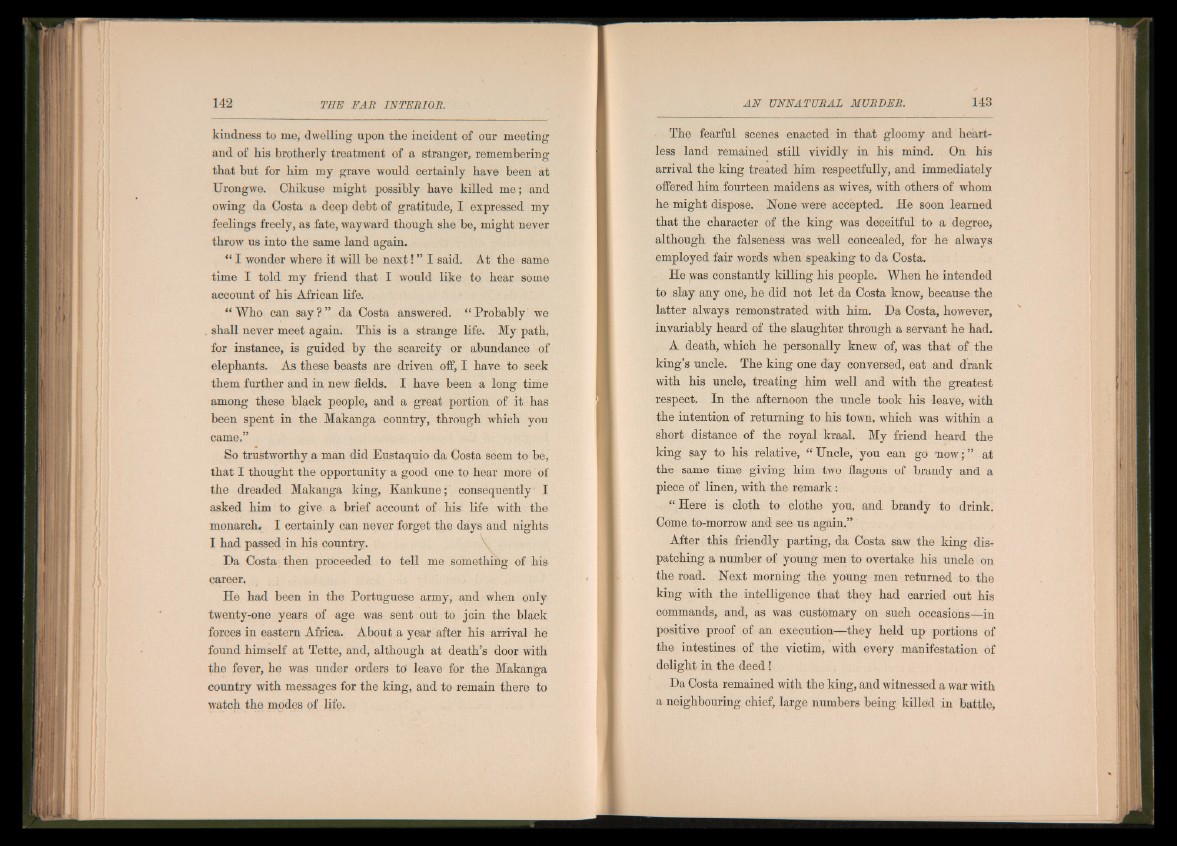
kindness to me, dwelling upon the incident of our meeting
and of his brotherly treatment of a stranger, remembering
that but for him my grave would certainly have been at
Urongwe. Chikuse might possibly have killed me; and
owing da Oosta a deep debt of gratitude, I expressed my
feelings freely, as fate, wayward though she be, might never
throw us into the same land again.
“ I wonder where it will be n ex t! ” I said. At the same
time I told my friend that I would like to hear some
account of his African life.
“ Who can say ? ” da Costa answered. “ Probably we
shall never meet again. This is a strange life. My path,
for instance, is guided by the scarcity or abundance of
elephants. As these beasts are driven off, I have to seek
them further and in new fields. I have been a long time
among these black people, and a great portion of it has
been spent in the Makanga country, through which you
came.”
So trustworthy a man did Eustaquio da Costa seem to be,
that I thought the opportunity a good one to hear more of
the dreaded Makanga king, Kankune; consequently' I
asked him to give a brief account of his life with the
monarch# I certainly can never forget the days and nights
I had passed in his country.
Da Costa then proceeded to tell me somethihg of his
career.
He had been in the Portuguese army, and when only
twenty-one years of age was sent out to join the black
forces in eastern Africa. About a year after his arrival he
found himself at Tette, and, although at death’s door with
the fever, he was under orders to leave for the Makanga
country with messages for the king, and to remain there to
watch the modes of life.
The fearful scenes enacted in that gloomy and heartless
land remained still vividly in his mind. On his
arrival the king treated him respectfully, and immediately
offered him fourteen maidens as wives, with others of whom
he might dispose. None were accepted. He soon learned
that the character of the king was deceitful to a degree,
although the falseness was well concealed, for he always
employed fair words when speaking to da Costa.
He ¡was constantly killing his people. When he intended
to slay any one, he did not let da Costa know, because the
latter always remonstrated with him. Da Costa, however,
invariably heard of the slaughter through a servant he had.
A death, which he personally knew of, was that of the
king’s uncle. The king one day conversed, eat and drank
with his uncle, treating him well and with the greatest
respect. In the afternoon the uncle took his leave, with
the intention of returning to his town, which was within a
short distance of the royal kraal. My friend heard the
king say to his relative, “ Hncle, you can go mow ; ” at
the same time giving him two flagons of brandy and a
piece of linen, with the remark :
“ Here is cloth to clothe you, and brandy to drink.
Come to-morrow and see us again.”
After this friendly parting, da Costa saw the king dispatching
a number of young men to overtake his uncle on
the road. Next morning the young men returned to the
king with the intelligence that they had carried out his
commands, and, as was customary on such occasions—in
positive proof of an execution—they held up portions of
the intestines of the victim, with every manifestation of
delight in the deed !
Da Costa remained with the king, and witnessed a war with
a neighbouring chief, large numbers being killed in battle,